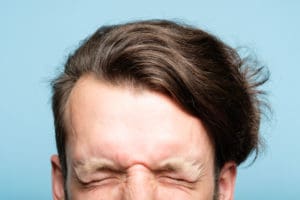Can You Go Blind From Staring at the Sun?
Home / Vision Education Center /
Last Updated:
Table of Contents
When parents tell their kids to never look directly at the sun, it is not an old wives’ tale. Staring at the sun can cause damage, and it can happen quickly. There are varying degrees of damage that are possible.
If you experience eye damage due to staring at the sun, there are symptoms that may develop. These symptoms range from mild to serious, depending on the degree of damage the eyes experienced.
A solar eclipse is a unique event that may cause damage to the eyes. It is important to understand what this event is and how it can hurt your eyes so you can take the right preventative measures.
Staring at the sun is not the only way that sun damage can occur. The sun can have various effects on the eyes, but there are things you can do to protect them.

What Happens When Someone Stares at the Sun?
The eyes are sensitive, so it makes it hard to look at any bright light for long. People instinctively look away and blink because discomfort starts to occur.
As soon as someone looks at the sun, sunburn starts happening. The sun produces visible, ultraviolet, and infrared light. The ultraviolet light is the most damaging to the eye’s structures.
With overexposure to UV light, the corneal cells start to crack and blister, much like a regular sunburn. The eyes can also feel gritty and excessive tearing can occur. At this point, if someone continues to stare at the sun, they can develop solar retinopathy.
Solar retinopathy can be permanent. It occurs when overstimulated light-sensing retina cells start to release signaling chemicals. This flood of chemicals can cause tissue damage. While recovery does occur for some people, it is possible to experience permanent visual acuity deficits.
Permanent retinal damage can occur when someone looks at the sun for 100 seconds or less. This is under two minutes.
Ultimately, how long it takes for damage to occur depends on several factors, such as the dilation of the pupil and the sun’s intensity on that specific day.
Symptoms of Staring at the Sun
The damage that can occur as a result of staring at the sun (solar retinopathy) can cause a variety of symptoms. Mild cases may result in:
- Discomfort when looking at bright lights.
- Headache.
- Watery eyes.
- Eye soreness.
In more serious cases, symptoms might include:

- Blurry vision.
- Trouble discerning shapes.
- A blind spot in the center of vision. In some cases, multiple blind spots occur.
- Reduced color vision.
- Distorted vision.
- Permanent eye damage.
Solar Eclipse
A solar eclipse is not a common event, but when they happen, people are naturally curious and want to experience it. The eclipse happens when the moon moves in between the earth and the sun, blocking the sun’s light from flooding the earth. This effect does not last long.
Retinal burns and eclipse blindness are possible if someone looks right at the sun during a solar eclipse. Doing so can cause damage to retinal cells. This effects the information that is sent to the brain, resulting in distorted images.
You deserve clear vision. We can help.
With 135+ locations and over 2.5 million procedures performed, our board-certified eye surgeons deliver results you can trust. Your journey to better vision starts here.
The damage that occurs can be permanent or temporary. For some people, the symptoms indicating damage do not occur for several days, so they have no idea that their eyes were affected by looking at the solar eclipse.
It is possible to experience distorted vision, a loss of central vision, and altered color vision. If someone notices any of these symptoms, they must see an eye doctor immediately to get a workup. This will determine the exact condition present and its severity.
Other Ways the Sun Can Damage the Eyes
There are more ways the sun can affect the eyes. For these effects to occur, someone does not need to look directly at the sun either. Simple exposure and going outside without eye protection can contribute to a higher risk of the following:
- Macular degeneration: This is characterized by the macula component of the retina sustaining damage. There is no cure for this condition. In the most advanced stages of macular degeneration, vision loss is noticeable, and people have a hard time seeing.
- Pterygia: This condition affects the sclera, but it can also invade the eye’s cornea. It is a type of growth that can cause a burning or gritty sensation in the eye.
- Cataracts: This occurs when the lens in the eye develops a cloudiness. As the cloudiness occurs, the eye’s lens makes it impossible for the retina to receive a sharp image. Vision can appear blurry, and things can take on a brownish or yellowish hue.
- Pinguecula: This is another type of growth, but it occurs on the conjunctiva. It is yellow in color. The affected area can be swollen or red; vision can be blurry; and the eyes may be itchy, dry, or have a burning sensation.
You deserve clear vision. We can help.
With 135+ locations and over 2.5 million procedures performed, our board-certified eye surgeons deliver results you can trust. Your journey to better vision starts here.
Is It Bad to Squint Instead of Wearing Glasses?

In short, yes: Staring at the sun even with a hard squint is bad because squinting does not protect against harmful UV rays. You still stand the same risk of the harmful effects of the sun rays.
The same goes for trying to protect yourself with sunglasses. No sunglass manufacturer has come up with a lens-building process that is 100-percent successful blocking out the sun’s harmful UV rays.
In fact, trying to skirt nature and squinting at the sun or wearing sunglasses while looking at it still exposes you to the UV rays, though it may not be apparent. Your retina does not have pain receptors, and you are at risk of developing solar keratitis or solar retinopathy.
You stand the same risk with the naked eye or with sunglasses on when trying to watch the sun during a solar eclipse. Because the moon blocks most of the bright light from a solar eclipse, your protective reflex does not kick in, and you expose yourself to severe eye damage.
Prevention Trumps Treatment with the Sun
Like another serious condition involving the sun, melanoma (skin cancer), prevention is better than treatment when it comes to your eyes and sunlight.
The obvious preventative measure is not to look at the sun directly in any conditions and no matter what you are using for eye protection (a hat, sunglasses or shade). As for solar eclipses, there are several safe ways you can view them, including creating a pinhole projector and using solar eclipse glasses.
You should never watch an eclipse using a telescope or binoculars because they magnify the sun’s rays that cause the most damage. In addition, don’t think you can sidestep the issues by trying to look at the sun with your camera lens, sunglasses or your smart phone in a selfie mode.
As for everyday eye protection, try:
- Wearing sunglasses all year round when outside. Wear a pair that come with the Skin Cancer Foundation seal of approval.
- Wearing a baseball cap or a farmer’s hat or some other head/neck cover. Look for items that have at least a three-inch brim to protect the top of your head and face. Such hats can block approximately half of all UV rays from your eyes.
- Finding shade whenever possible, especially when the sun is most intense.
You deserve clear vision. We can help.
With 135+ locations and over 2.5 million procedures performed, our board-certified eye surgeons deliver results you can trust. Your journey to better vision starts here.
References
- Ultraviolet Phototoxicity to the Retina. Eye and Contact Lens.
- Solar Retinopathy. American Academy of Ophthalmology.
- How Long Does It Take Before Your Eyes Get Damaged When Looking at the Sun? University of California, Santa Barbara.
- Ultraviolet (UV) Radiation and Your Eyes. All About Vision.
- Solar Eclipse and Your Eyes. Prevent Blindness Foundation.
- Will looking at the sun really make you blind? (October 2017). Australian Academy of Science.
- Why Shouldn’t You Stare at the Sun? (September 2018). Healthline.
- The Sun & Your Eyes. (June 2019). The Skin Cancer Foundation.
This content is for informational purposes only. It may have been reviewed by a licensed physician, but is not intended to serve as a substitute for professional medical advice. Always consult your healthcare provider with any health concerns. For more, read our Privacy Policy and Editorial Policy.